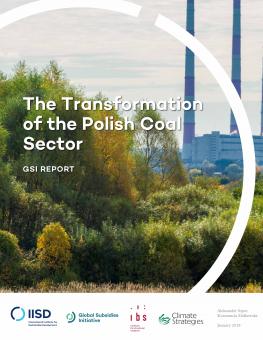
The Transformation of the Polish Coal Sector
Although Poland remains one of the most coal-dependent economies in Europe, there have been significant job losses in mining since 1990 This study reviews some of the policies introduced to mitigate the effects of these losses.
Poland has a strong tradition of coal mining and coal fired power.
Coal was the basis of the country’s industrialization, and today coal fired power still accounts for over 80 per cent of total electricity generation. With a large part of this coal coming from domestic sources, continued use of coal is often viewed as an important strategy in maintaining both energy independence and security. Aside from economics, the strength of the coal unions in Poland, and government ownership interests in both coal mining and the power sector, mean that the industry is central to both political and social discourse.
In spite of these factors, coal mining in Poland has witnessed a massive decline in employment from almost 400,000 miners in 1990 to around 100,000 miners in 2014. Prompted by the economic and social reforms associated with the fall of Communism, these job losses were largely a result of efficiency improvements.
This study considers the policies and strategies that were adopted to help manage the decline in employment.In particular, it focuses on two measures: the Mining Social Package and Special Privileges for Mining Communes. It assesses the success of each of these policies in mitigating the adverse social and economic impacts of the decline of the industry and considers their relevance to the challenges of coal phase out today.
You might also be interested in
COP 29 Outcome Moves Needle on Finance
In the last hours of negotiations, concerted pressure from the most vulnerable developing countries resulted in an improved outcome on the finance target, with a decision to set a goal of at least USD 300 billion per year by 2035 for developing countries to advance their climate action.
The United Kingdom, New Zealand, and Colombia Join Coalition to Phase Out Fossil Fuel Subsidies
Today on the sidelines of the UN Climate Conference in Baku (COP 29), the United Kingdom, New Zealand, and Colombia joined the international Coalition on Phasing Out Fossil Fuel Incentives Including Subsidies (COFFIS).
COP 29 Must Deliver on Last Year’s Historic Energy Transition Pact
At COP 29 in Baku, countries must build on what was achieved at COP 28 and clarify what tripling renewables and transitioning away from fossil fuels means in practice.
How Indonesia's Incoming President Can Advance the Transition to Clean Energy
With Prabowo Subianto inaugurated as Indonesia’s President, speculation abounds about the new administration’s commitment to the clean energy transition and climate targets, given Prabowo’s positioning as the “continuity candidate.” The question is, what, exactly, will be continued?